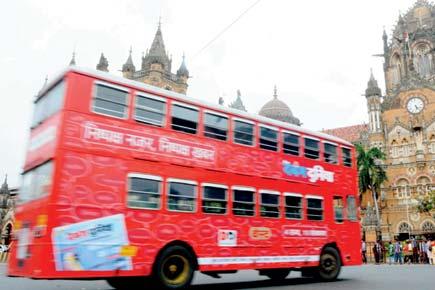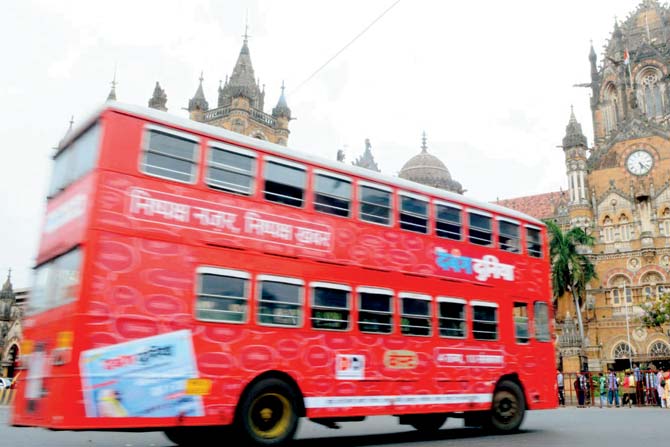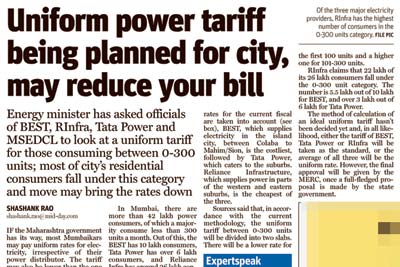In a bid to stem the annual R800-crore losses of BEST, an idea has been mooted, where this loss would be borne by lakhs of power consumers — including those who get electricity from Reliance Infrastructure, Tata Power and MSEDCL

BEST
What if your electricity bill jumps by another Rs 200 or so, despite your consumption remaining the same? This hike might just become a reality. In a bid to stem the annual Rs 800-crore losses of BEST, an idea has been mooted, wherein this loss would be borne by lakhs of power consumers — including those who stay in the suburbs and get electricity from Reliance Infrastructure, Tata Power and MSEDCL (Maharashtra State Electricity Distribution Co Ltd).

If the proposal goes through, the amount collected from this transport surcharge in electric bills of RInfra and Tata Power could get transferred to BEST. File PIC
ADVERTISEMENT
Sources said that there have been discussions on replacing the existing Transport Deficit Loss Recovery (TDLR) — the component that exists in BEST's power bills now but will be removed after 2015-16 — with a new charge.

TDLR is mainly a charge that is meant to recover transport losses incurred while plying the Undertaking’s buses, through electric bills.
There have been severe protests on applicability of TDLR as 10 lakh power consumers of BEST were bearing losses incurred of 35 lakh plus bus passengers, who use bus services throughout Mumbai and its satellite towns of Navi Mumbai and Thane.
“The whole idea is to see the feasibility if the TDLR charges can be shared by all power distributors supplying to Mumbai. This would ensure that all those areas where our buses are used too share its losses,” said a BEST official on condition of anonymity.
Ticket to ride
Presently the TDLR is divided in all categories to the tune of 55 paise to 1.85 paise per unit (see box). These categories range from those consuming 0-100 units to those consumers using 500 units and more. Sources said that once TDLR gets capped, there is still a need to retain a medium for recovering transport losses; the logic is, if this cess gets divided amongst all the power distributors then the burden would come down on individual consumers. The probable tariff that this could encompass is expected to be between 60-90 paise per unit depending on the tariff slab.
This would mean that a residential household consuming an average of 300 units will have to pay a minimum of R200 or more on their electricity bills. There are around 45 lakh power consumers in Mumbai that includes BEST, RInfra, TPC and MSEDCL (that supplies to Kanjurmarg, Bhandup and Mulund), apart from those in Navi Mumbai and Thane.
“The amount collected from this transport surcharge in electric bills of RInfra and TPC, could get transferred to BEST. However this proposal is at a nascent stage,” said a power expert.
Moreover, sources said that there is no provision in the Electricity Act where such an arrangement can be entered into by power companies, and that it would require procedural amendments in the Act.
The BEST had proposed having a 1-3 per cent transport cess on property tax to the BMC and state government. This was a replacement of TDLR that was to end by March 2016. The BEST was to recover around R150 crore annually through this cess. However until now there hasn’t been much clarity on the same.
Uniform tariff
The Maharashtra government is already looking at the option of having a uniform tariff for Mumbai. The power distributors and state government authorities have had around four meetings on this issue until now. mid-day had earlier reported about this plan (May 15, ‘Uniform power tariff being planned for city, may reduce your bill’).
As per this proposal, all consumers in Mumbai consuming 0-300 units will have the same per unit charge. The tariff may be selected based on the cheapest tariff charged by all power distributors.
Presently there hasn't been much progress on the idea; officials said that apart from legal changes in the Act, the government should also be ready to pay over Rs  1,000 crore annually to the power distributors for the losses incurred through this subsidy of uniform tariff.
1,000 crore annually to the power distributors for the losses incurred through this subsidy of uniform tariff.
 Subscribe today by clicking the link and stay updated with the latest news!" Click here!
Subscribe today by clicking the link and stay updated with the latest news!" Click here!







